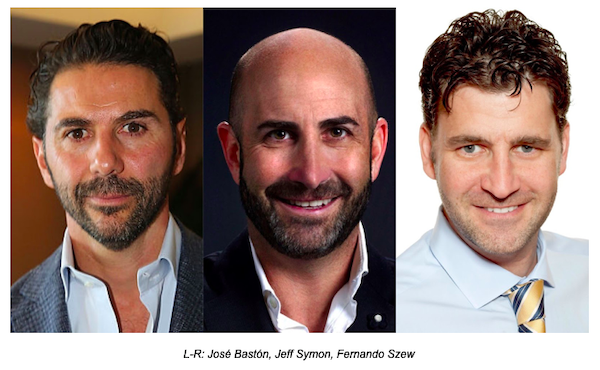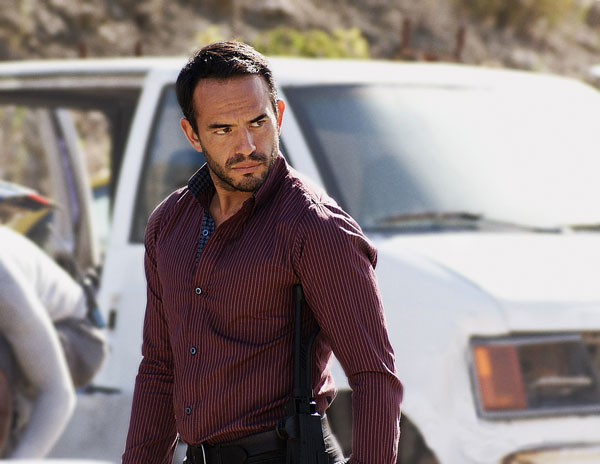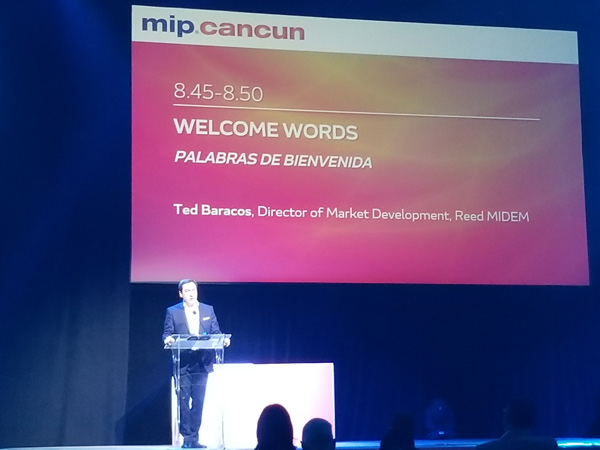MarVista Entertainment’s Kenneth Christmas, MGM’s Matt Vassallo and Keshet International’s Kelly Wright discussed business opportunities in Latin America at a MIP Cancun panel moderated by World Screen’s Anna Carugati.
Keshet International’s (KI) recent deals in the region include BOOM! being adapted by Caracol in Colombia and several sales in Brazil, Wright, VP of distribution and new business, told delegates. “Brazil has always been a great market for our content,” she said.
MarVista Entertainment has produced three films with Caracol, said Christmas, executive VP of business and legal affairs, and it has a number of co-pro partners. “We’re looking to expand and take advantage of what we see as a pretty significant opportunity to tell stories in this region that have global distribution capabilities. We’ll be looking to do movies and series throughout LatAm.” The company also distributes to platforms across the region via its partner Snap.
Vassallo, senior VP of international television distribution, free TV sales and strategy and Latin America at MGM, cited a recent deal with Viacom’s Paramount Channel for The Handmaid’s Tale. MGM is also shopping formats to LatAm, with Vassallo expressing optimism about the prospects for Funderdome. “The new business venture we’re entering is a Luis Miguel series” focused on the famous Mexican singer. The Spanish-language drama is being produced for Telemundo, with Netflix taking the first window for LatAm, Vassallo said, and Televisa taking Mexican free-TV rights.
Carugati asked the panelists about the biggest changes in the region. Vassallo said that for MGM, it’s been the weakening of the free-TV feature-film business. “Traditionally a lot of the studios would have full-slate deals for all of their features and all of their series in many free-TV territories around the world. It’s not quite that way anymore. Clients are being more selective in selecting properties from each studio that they think will work for them rather than the big slate deals. It’s made us have to think about how we are going to reach a free-TV audience. Our feature films and series are thriving in basic and pay TV, and that’s fine, but we need to figure out a way to reach free TV and reach a mass audience. That’s what we’re doing with the Luis Miguel series. That’s the biggest change, movies migrating up the windowing scheme, more viewing in SVOD and pay and basic and less in free TV.”
KI’s Wright cited “brand identification,” noting that free-TV broadcasters have had to move away from the traditional forms of programming that sustained them for decades. “They’ve had to become more distinctive in a market with many more players, and of course that’s a result of the OTT entrants in the market, which are starting to usurp a lot of those viewers, particularly the younger viewers. We’ve really seen a stronger upping of the ante in terms of the risks they’re taking. Televisa is producing a 13-episode comedy series, who would have thought that would happen five years ago? We see a real shift and a real willingness to evolve, quickly and effectively, towards a permanent new reality and not just to experiment. There’s a real push, financially and creatively, to bring in a lot of new talent.”
For MarVista, “We’ve found there’s a lot of opportunity [in LatAm] because of OTT,” Christmas said. “We will continue to exploit it, maybe with a little more flexibility than some of the larger U.S. studios.”
The lines between TV movie and feature and series are blurring, Christmas added. “Good movies are good movies, good stories are good stories. Our movies generally don’t get a wide theatrical release, but they do travel well in a variety of windows.”
Carugati asked the panelists how their companies are responding to market changes. KI’s Wright discussed the upending of the traditional distribution market, with sellers now having to decide to take their wares to individual free-TV players first or lock up a global first-window deal with an OTT service. “You have to think about what would be the best outlet for this type of content. And also, what’s fair to the buyers? It isn’t fair for everything to go to one global super-brand. A lot of buyers in Europe are fighting back against that model. That will happen in Latin America, too.”
MarVista’s Christmas said the digital platforms reflect an “enlargement of the pie. It creates more opportunities. In LatAm and the Caribbean, the number of households that get services digitally has doubled in the last five years. That trend will continue.”
MGM’s Vassallo said the biggest move the studio has made to help boost its free-TV business was the creation of the Gato Grande joint venture with Mexican entrepreneurs Miguel Aleman and Antonio Cué. “The purpose is to produce Spanish-language series. That’s our play to get into free TV in the manner we used to with our feature films.”
KI, meanwhile, has opened a production company in Mexico. Keshet MX aims to be a “local, boutique production company with organic roots and a team who is really local, with an international sensibility and a powerful international business and distribution arm behind it.” That enables both import and export businesses. “We’ve seen so many amazing broadcasters in Latin America, like Globo, Televisa, Telefe, who have successful telenovelas and series that can air all over the world, but they don’t have adaptations in the U.S. market. Why is that? It should be a natural migration towards that market, which is so accepting of formats from other territories. Mexico is a natural gateway between North America and South America, where there are so many ideas and such a fertile ground for this kind of content, especially in the scripted world.”
Carugati asked Christmas about MarVista’s experience with co-pros. “By partnering, you get authenticity. That’s the beauty of today’s marketplace. Good stories will travel and that’s important for us as we look at partnerships. In the coming years we’ll announce a number of partnerships with large entities that have a presence in Latin America, because we want that authenticity. Hopefully we can curate what we produce so it has global appeal.”
On partnerships, Vassallo said MGM is keeping an eye out for IP-based projects, be it a book, movie or life story. “It’s a response to broadcasters who, when they launch something, want some inherent marketing within the IP, so people already know what it is. That helps us sell.”
The panel wrapped with a discussion of the challenges and opportunities they expect in the region in the next 12 months.
KI’s Wright said, “The trend I keep seeing that I think is having an adverse effect on our business in Latin America is the jumping on the bandwagon. ‘Telemundo picked this up? I’ll co-produce too.’ And then five other countries are all airing the same content, the same show. That’s really preventing creators and producers from doing their thing. People don’t want to see the same content in Colombia as Mexico. This needs to stop. I keep hearing broadcasters say, we need something different, we want our own Game of Thrones, we want to own it and fully finance it if we can. You see TV Azteca opening up Dopamine. So it’s happening, it needs to happen and the Latin American viewers deserve for it to happen.”
Vassallo said MGM aims to continue to expand and develop Gato Grande, delivering more Spanish-language fare. “There are a lot of production companies and studios out there. It’s getting to be a better time for independents, because they’re nimble. Rules and regulations are changing [in terms of local content quotas]. That’s going to lead to more creativity and more opportunity.”
MarVista’s Christmas said that digital platforms are making “the pie bigger. We’re excited for that activity. We want to be part of it.”
 TVLATINA
TVLATINA






